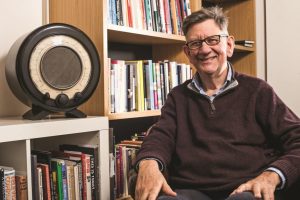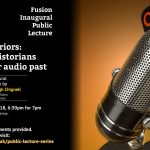 Over the last twenty-five years, Bournemouth University (BU) has built up a wealth of expertise in the area of media history. Not only has this knowledge helped to better understand the development of radio programmes of the time, but it is also helping to inform the teaching and education of future broadcasters.
Over the last twenty-five years, Bournemouth University (BU) has built up a wealth of expertise in the area of media history. Not only has this knowledge helped to better understand the development of radio programmes of the time, but it is also helping to inform the teaching and education of future broadcasters.
Professor Hugh Chignell, Head of BU’s Centre for Media History, is a well-known media historian who specialises in radio broadcasting – covering both news and drama programmes. His research in the area began in the late 1990s when Bournemouth University began to host an archive of radio programmes produced by the BBC.
“At the time that we began hosting these archives, there were a number of researchers at BU who were keen to learn more about the history of radio and TV broadcasting. They felt it would be useful knowledge for our students, who would hopefully go on to produce future broadcast content,” explains Professor Chignell, “It was an approach to teaching pioneered by Bournemouth and became a really useful resource for our undergraduates, as it gave them a sense of where our contemporary radio and TV broadcasts come from. It’s also what sparked my own PhD research.”
For his doctoral research, Professor Chignell explored BBC Radio 4’s longstanding current affairs programme, Analysis. His research spanned a wide range of topics, including the political nature of current affairs programmes, the evolution of news and current affairs at the BBC and a better understanding of how to interpret old radio content.
“Current affairs programmes are reasonably unique to British media culture,” says Professor Chignell, “The BBC chose to keep its news broadcasts purely factual, in order to maintain their impartiality, but its current affairs programmes were very different. Their focus on explaining the context of the news and what was going on around it made them quite political.”
“For example, the Analysis programmes of the 1980s were partially responsible for introducing listeners to the neoliberal policies and ideas of Margaret Thatcher’s government. Although the programme itself didn’t have a political agenda, its role in making policies more accessible did end up giving it a political stance.”
Through his research, Professor Chignell also developed a better understanding of how to listen to and interpret old radio programmes, as outside of their temporal context, some broadcasts can be difficult to fully appreciate. Often their creators and producers are no longer around to ask questions of, which means that understanding the context in which they were made, can be a challenge.
“Older radio programmes can sound quite strange to us now. It’s not the same experience as watching an old Hollywood film, for example,” explains Professor Chignell, “My current research interests are around radio dramas of the 1950s. To fully appreciate them, an understanding of 1950s theatre is needed, as radio productions were heavily influenced by trends in the theatre. For that era in particular, French theatre dramas were extremely influential.”
“The first step for any media historian is to understand the context – what happened, the programmes that were made and what was said. Only then can you move onto the analysis, which enables us in the present to learn from the past. By exploring older radio dramas, for example, you can gain quite a fascinating insight into the culture of the time, often in quite a surreal way.”
“Not only does it give us a window into the past, but it can help to spark ideas for the creation of new programmes and broadcasts.”
Bournemouth University’s Centre for Media History was established in 1998 and compromises over 20 academics and post-graduate researchers from across the university. While it takes its origins from an interest in radio history, the Centre now specialises in media history across all forms of broadcast media.
For more information, see:
This article was featured in the 2018 Bournemouth Research Chronicle. To see the magazine in full, click here or pick up a copy in Poole House or Studland House reception.
 Archive warriors: How radio historians research our audio past – new inaugural lecture
Archive warriors: How radio historians research our audio past – new inaugural lecture










 BU attendance at third annual GCPHR meeting in June
BU attendance at third annual GCPHR meeting in June Interactive Tangible and Intangible Heritage Applications – BU student work featured in new book chapter
Interactive Tangible and Intangible Heritage Applications – BU student work featured in new book chapter Second NIHR MIHERC meeting in Bournemouth this week
Second NIHR MIHERC meeting in Bournemouth this week MSCA Postdoctoral Fellowships 2025 Call
MSCA Postdoctoral Fellowships 2025 Call ERC Advanced Grant 2025 Webinar
ERC Advanced Grant 2025 Webinar Horizon Europe Work Programme 2025 Published
Horizon Europe Work Programme 2025 Published Horizon Europe 2025 Work Programme pre-Published
Horizon Europe 2025 Work Programme pre-Published Update on UKRO services
Update on UKRO services European research project exploring use of ‘virtual twins’ to better manage metabolic associated fatty liver disease
European research project exploring use of ‘virtual twins’ to better manage metabolic associated fatty liver disease